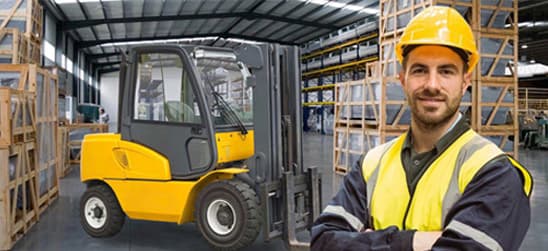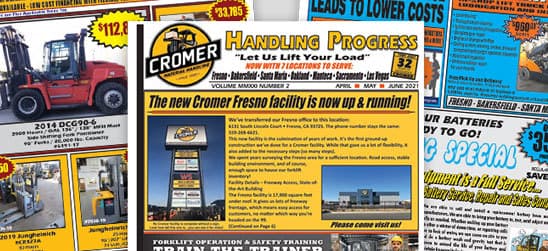Frequently asked questions about forklifts, safety training, and the Cromer Companies
Curious about forklift training? How do forklift accidents happen (and how do we prevent them)? Which forklift should I buy? The Cromer Team has the answers!
You'll find answers to these and other questions we receive regularly below. If these FAQs don't answer your question, call us and we'll get you the answers you need!
Marshall Cromer started East Bay Clarklift, Inc. on October 17, 1989. In 1994 we added the Daewoo/Doosan forklift line. In 1998, we became the Bay Area distributor for Caterpillar forklifts, and took on the Kalmar large forklift line. In 2010, we started to call ourselves "Cromer Material Handling" to showcase the complete material handling resource we've become. Since then we've added Princeton, Linde, and BYD forklifts to our brands as well. Over 25 years of getting you the right product for the right job.
Electric forklifts have incredible lasting power. You can get two or even three shifts on one battery charge. Newer electric models even use green components in their batteries.
Diesel forklifts work best for huge loads, such as shipping containers. They have a high up-front cost and must receive regular maintenance.
Propane or LPG forklifts are good for all-around warehouse & outdoor work. They do require regular maintenance, and can fail suddenly if not maintained well.
How will you use the forklift? That's the big decider. We have an article on "Choosing the Right Forklift Tire" on our blog to help you.
We generally recommend you buy the right forklift for the job. Investing in a purchase is a better ROI over time. However, we'll work with you to determine if a forklift lease suits your business better.
We are the licensed distributor for Caterpillar, Jungheinrich, BYD, Doosan, Kalmar, Linde, Combilift, Princeton, Sellick, and Donkey forklifts.
We also stock many allied products, including a large Rack and Shelving inventory. All the products we offer come from industry leaders that stand behind the great products they offer, and we take pride in passing that along to our customers.
Cromer Material Handling's headquarters is located in Oakland, just off the 880 freeway near the Oakland Coliseum. We also have facilities in Sacramento, Manteca, Fresno, Bakersfield, Santa Maria, and Las Vegas, NV. As a result, we provide new and used lift truck sales, service, parts and rentals all throughout California and Nevada.
There is no difference between a "lift truck" and a "forklift." Same thing.
Lift trucks can go by several other names including a high/low, trailer loader, tow-motor, side-loader, or a fork hoist. They are all IC powered and electric industrial trucks designed to lift and transport materials.
You can now get forklifts powered by 80-volt electricity. These new electric forklifts are environmentally friendly, quieter, and can be less expensive to operate.
By law, employers must ensure that their industrial truck operators receive both hands-on and formal (classroom) training by a qualified instructor.
In order to remain compliant, all forklift operators must receive training. Compliance with these regulations is the employer's responsibility. All forklift/lift truck operators must be retrained EVERY 3 YEARS.
Requirements include:
- Classroom training with specific requirements;
- Work site hazard training;
- Orientation to specific lift truck models being used;
- Skill assessment of individual operators
Yes, you must retrain every 3 years.
In addition, OSHA 29 CFR 1910.178 regulations for Forklift Operator Training includes a requirement for Refresher Training when:
- Personnel have observed operators operating in an unsafe manner.
- There has been an accident or a near miss.
- Operators receive reassignment to a new type of truck, or a different work environment.
Forklifts are an essential part of many industrial operations, but they are also involved in 10 percent of all serious industrial accidents every year.
Forklift-related accidents result in nearly 100 deaths and 20,000 serious injuries each year.
One percent of factory accidents involve forklift trucks, but the forklift accidents produce ten percent of the physical injuries.
- 26% of forklift accidents occur due to the forklift tipping over from overloading weight.
- 18% of forklift accidents involve employees or pedestrians being hit by forklifts.
- 14% of forklift accidents occur by the load falling off the forklift.
- 14% of forklift accidents occur when forklifts are used to elevate people.
- 7% of forklift accidents occur due to forklifts accidentally being driven off loading docks.
- 7% of forklift accidents occur due of improper or no forklift maintenance such as malfunctioning of the brakes, steering, transmission, or hydraulic system. Missing or malfunctioning safety devices can contribute to a forklift accident. Forklifts should be equipped with a roll over protection system, which will prevent the forklift operator from being thrown or crushed, should the forklift tip over.
- 7% is caused by improper workplace design for forklift operation such as narrow or crowded aisles, a high level of foot traffic where the forklift is operated, vision obstructions, and other workplace conditions such as light and noise are all hazards that might contribute to a forklift accident.
- 3% of forklift accidents occur because of loss of forklift control by the operator.
- 3% of forklift accidents occur because of improper use of fork lift.
Under the new regulations, all industrial truck operators in all industries are included in OSHA Standard 29CFR1910.178. That includes but is not limited to Construction (1926), General Industry, Shipyards (1915), Marine Terminals (1917) and Longshoring operations (1918), with the exception of Agricultural Operations.
All industrial truck operators hired AFTER December 1, 1999, must receive the required training and written evaluation BEFORE they are allowed to operate the equipment, and the company must maintain an operator file with proof of adequate training.
Forklift trucks are so dangerous that the Fair Labor Standards Act (FLSA) prohibits any workers under age 18 from operating forklifts or similar equipment in non-agricultural industries. No one over 18 may operate them unless they have received proper training and authorization.
Still have a material handling question?
Ask the Cromer Team! Visit our Contact Us page and submit your question.

5 Red Flags to Watch Out for When Buying Used Forklifts
Watch out for these ‘red flags’ when buying your next used forklift. (Hint: Cromer takes care of all 5)
Read the ArticleFORKLIFT SAFETY TRAINING
Reserve your operators' next forklift Safety Training at Cromer!

Handling Progress PDF
Find exclusive deals on forklift & equipment sales from Cromer's quarterly Material Handling newspaper!


